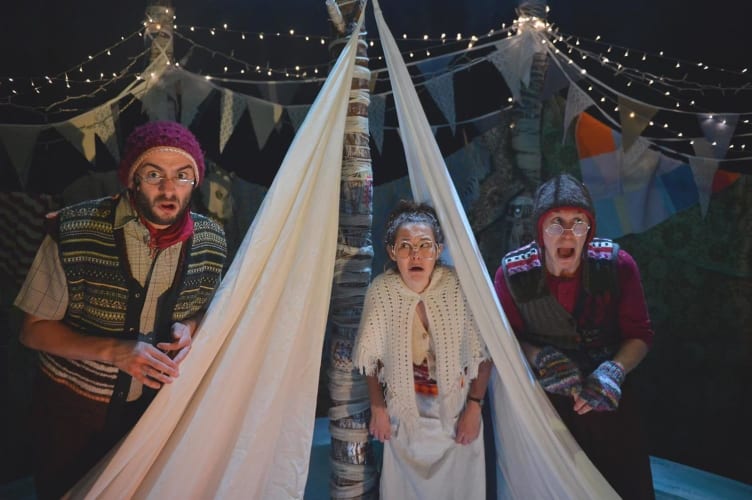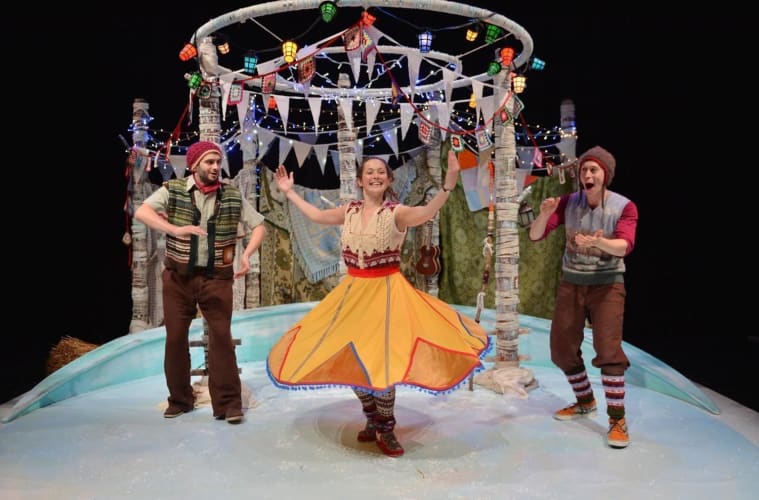The latest product of what is clearly a winning combination sees tutti frutti theatre and the York Theatre Royal team up again with Mike Kenny on sparkling form providing the script, and TC Howard once more providing fun, inventive movement work.
The result is a warming, wintery tale which takes the idea of shepherding, which is at the root of the fable on which it’s based, and spins out in several directions. Most obvious is the prevalence of wool in the props and costumes and, as the show begins, the three cast members are dotted around the auditorium, bespectacled, nattering and clacking away with their needles, jealously comparing progress on scarves.
It’s a very Kneehigh-esque touch, and, like the binoculared spotters in that company’s Tristan and Yseult, these three team up as a chorus, as well as shifting in and out of the various characters in the tale. It all comes together naturally and with a sense of magic and wonder, helped ably by Kelly Jago’s simple, folksy set and effective lighting work from Nick Duncan.
Kenny’s script begins pared back and poetic, with joyous assonances and rhythms building simple but powerful images: the action opens with ‘the winter wind, whistling down the hills’, evoking the faint smell of snow.
The eponymous boy, played by Mathew Hamper with twitchy, wide-eyed youth, begins bored and dreaming of spaces beyond the hills and mountains which surround him and his mum. Mother (Sally Ann Staunton) knits endlessly and can’t see the problem of living in a town where ‘nothing ever comes or goes’. Thomas Edward-Bennett, as the main storyteller and the boy’s grandfather, completes the picture as the ageing shepherd who can’t keep up with his flock any more.
The three performers are sympathetic and energetic, particularly when incarnating the dopey, uncooperative sheep, who get their own song and dance number. The three form a musical trio of accordion, guitar and violin, with effective harmonies and lovely lyrics, the music composed by Dominic Sales.
Wendy Harris’s direction is simple and inventive, and there are a couple of beautifully ingenious moments. One of these sees the perspective shift from the village itself up to the hills in which the shepherds watch their flocks, cleverly enabled by a lovely set of model houses. There are some lovely, gently-made observations on family life and growing up, and strong verbal (and visual imagery) throughout.
The younger children in the audience were transfixed, and there is much for us older ones to chuckle at as well. The story is happily resolved—perhaps too happily, as the boy who cries wolf is given, rather than a dressing down, a hero moment. I suppose no one wanted to see those singing lambs slaughtered. It slightly blurs the ending, though the general jollity and beauty of the writing does carry it off.
The show is recommended for children ages three and up and their families. Despite the happy ending, there are moments of peril, and I suspect the most troubling aspect for very little ones might be the transforming nature of the storytellers. The few occasions on which they become the wolves are sensitively and gently done, but might worry the very sensitive.
But, judging by the faces of the youngsters in the audience (as well as their families), they seemed to enjoy it as much as I did. A couple of loose threads, perhaps, but on the whole a ripping yarn.
The Boy Who Cried Wolf is at the Theatre Royal Studio until 12 October, then tours around the UK.


